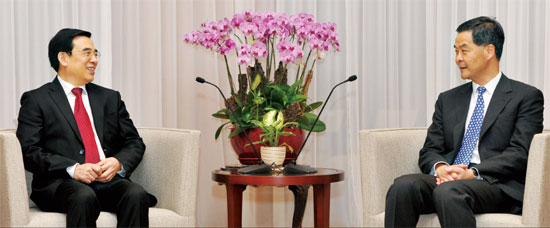Ample room for Beijing-HK cooperation
16 January 2013
Beijing and Hong Kong have ample room for cooperation in financial services and promoting yuan internationalization as the two cities share various complementary qualities in the financial industry, participants of the 16th Beijing-Hong Kong Economic Cooperation Symposium said.
|
 Wang Anshun (left), acting mayor of Beijing, exchanges views with Chief Executive Leung Chun-ying in Hong Kong on Nov 5, 2012. [Photo / China Daily] |
“Beijing evolves itself as the nation’s economic management, information and services center. It is also the country’s economic policy-making center,” said Gou Zhongwen, vice-mayor of the People’s Government of Beijing Municipality.
“Hong Kong is the international financial center with strong niches in fund-raising, asset management and financial talent supply. Both cities can share their distinct advantages and complementary qualities that can provide abundant cooperation opportunities for both cities’ financial industry players,” Gou noted.
“Both cities are corporate headquarter-orientated centers. Enterprises in Beijing can utilize their subsidiaries in Hong Kong for overseas development while the Hong Kong counterparts can leverage on Beijing’s advantage of being the economic information center in the country,” Under Secretary for Financial Services and the Treasury Julia Leung said.
Aside from becoming a strategic pillar industry of Beijing, the financial industry has also realized 11.7 percent added value in the first quarter of 2012 over a year earlier, accounting for 14.6 percent of the local gross domestic product.
In addition to financial services cooperation, both cities can leverage on the complementary qualities in the finance industry to further consolidate the offshore yuan business in Hong Kong.
“Mainland enterprises in the Beijing headquarter can utilize the Hong Kong offshore yuan financing platform to raise funds and hedge their financial risks,” Leung said.
As yuan-denominated financial products are growing more diversified in Hong Kong ranging from traditional yuan deposits to exotic futures trading, the city’s depth and breadth in offshore financial business is paving the way to consolidate the yuan internationalization process through the expansion of the yuan currency repatriation channel.
The Hong Kong Exchanges and Clearing Ltd in September launched the city’s first deliverable yuan currency futures contract based on the yuan and US dollar exchange rate that provide a tool for hedging yuan currency risk.
On the traditional financial product front, yuan-denominated share trading is also making its debut when the Hopewell Highway Infrastructure became the first company to issue yuan-denominated and Hong Kong dollar-denominated share tranches simultaneously in late October.
Besides the yuan IPO, Hong Kong investors can also invest in other five yuan-denominated exchange-traded funds that track the mainland A-Share indices and gold price movement. There is also a yuan-denominated real estate investment trust called Hui Xian traded on the local bourse. In addition, there are 41 yuan-denominated bonds listed in Hong Kong, according to the HKEx data.
Other yuan fund repatriation channels have also flourished. The China Securities Regulatory Commission in total has approved 70 billion yuan renminbi qualified foreign institutional investors (RQFII) quota, which allows yuan funds raised offshore to flow back to invest in the mainland share and inter-bank bond market as well as Hong Kong listed ETFs that track A-Share indices.
The mainland government also approved the renminbi qualified foreign limited partner program that allows yuan raised offshore to invest in mainland unlisted companies in the form of private equity fund.
The city enjoys the largest yuan liquidity pool in the world outside the mainland- as yuan deposits in September reached 545.7 billion yuan. The total yuan remittance for cross-border trade settlement amounted to 239.2 billion yuan in September, according to the statistics of the Hong Kong Monetary Authority.
In the first seven months of 2012, the issuance amount of yuan-denominated bonds totaled 79 billion yuan that represented some 50 percent more than the same period last year. In addition, there has also been a significant expansion in the range of dim-sum bond issuers.

Recent Comments